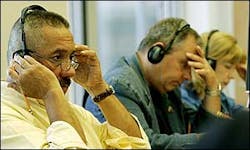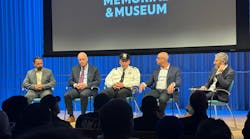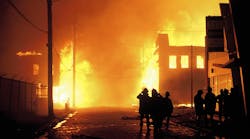The FDNY found tapes with more than 1,600 calls in recent months after turning over 130 tapes earlier this year.
New York, N.Y.-- It is five years, but when you hear voices of civilians and emergency workers who were trapped inside of the World Trade Center, it takes you back to that day on "September 11th". FDNY released recordings of phone calls offering a greater insight.
New York Times Audio Newly Released:
Video: 9/11 WTC Tapes Released
Eyewitness News' Sarah Wallace has the story.
We have listened to it so many times and it doesn't get easier. I think it gets harder because we really know what happened and we know so much more. What is released is more than 1600 phone calls made to emergency services that morning.
Most are made from people on the outside, three dozen are those immersed in the struggle for survival. It is difficult five years later.
The frantic exchange between Melissa Doi is one of the 1600 released today. Some brief four minutes of Doi's frantic conversation had already been released as evidence during the trial of convicted terrorist Zaccarias Mousssaui.
The panic of the young woman trapped on the 83rd floor is evident in the tapes.
Melissa Doi worked for IQ Financial Services on the 83rd floor of the south tower. Her office had filled with smoke.
Doi: "I'm going to die. I know I'm going to die," Doi told a 911 operator, while the operator replied, "No, no, no, no, no, no."
Doi: "Please, God, it's so hot. I'm burning up."
Doi: "Are they going to be able to get somebody up here?"
Operator: "Of course, ma'am. ... We're coming up for you."
Doi: "Well, there's no one here yet, and the floor is completely engulfed."
In those minutes you hear the voice of woman who realizes she is about to die.
Later, Doi said she couldn't breathe: "I don't see any air anymore; all I see is smoke."
Operator: "Ma'am, say your prayers."
After a time, Doi thought she heard the firefighters coming into save her.
Doi: "Help, help, help, help."
But now, we hear the remaining 20 minutes. A judge limited the release of the 10 civilian conversations on the tapes to just the operator's responses but we can almost hear the trapped woman's unspoken words. Believing she is dying, the young woman asks for a stranger's help to call Doi's mother.
Dispatcher: Melissa, you're going to be fine. Everybody's going to be fine. You're going to come and tell your mother yourself what a good mom she is.
(no sound from Melissa)
Dispatcher: I go the phone number, don't worry about that. You're gonna be alright.
There are also calls from 21 firefighters who died, many frustrated by the now well-documented breakdown on communications.
Why the release of the tapes now when others were released earlier this year? The Fire Commissioner blames bad management, someone missed these, now, they're public and so is the pain again.
Exchanges involving nine civilians are included in these tapes along with 21 firefighters who died.
In the call Doi tells the operator to call her mother. The call lasted 24 minutes, four minutes of which were used as evidence in the Moussaoui trial. The remaining 20 contains the operator's voice as she tries to contain Doi as she died on the phone.
The New York Times and families of Sept. 11 victims sued for access to the emergency calls and firefighters' oral histories. Attorneys said they wanted to find out what happened in the towers after two hijacked jetliners crashed into them and what dispatchers told workers and rescuers in and around the buildings.
The city in March released transcripts of 130 calls from people trapped in the towers, including only the voices of operators and other public employees. The callers' voices were cut out after city attorneys argued that their pleas for help were too emotional and intense to be publicized without their families' consent.
Stay tuned at 5:00 pm for a response from the families of the victims.
WABC-TV, Copyright 2006.
Republished with permission of WABC-TV.
Related Links






